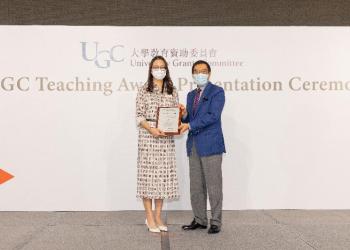News & Stories
2021

News
HKUST Professor Wins UGC Teaching Award 2021
Prof. Rhea Patricia LIEM, Assistant Professor at the Department of Mechanical and Aerospace Engineering of the Hong Kong University of Science and Technology (HKUST), received the University Grants Committee (UGC) Teaching Award 2021 under the category of Early Career Faculty Members today, in recognition of her dedication and outstanding teaching performance.

News
HKUST scientists demonstrated high-performance photodetectors (PDs) grown on SOI for silicon photonics
A research team led by Prof. Kei-May LAU of the Department of Electronic and Computer Engineering at Hong Kong University of Science and Technology (HKUST) has recently developed a novel semiconductor deposition scheme and demonstrated high-performance photodetectors (PDs) grown on silicon-on-insulators (SOI) for silicon photonics. These III-V photodetectors are qualified candidates for high-speed data communications in silicon photonics. These results point to a practical solution for the monolithic integration of III-V active devices and Si-based passive devices on the SOI platform in the future.

News
AI-driven Resiliency
Patrick TU (right) and other cofounders of Dayta AI navigated through failures and challenges with resilience and determination.
Resilience is a survival trait for start-up entrepreneurs. Patrick TU and his teammates, all aged 26, knows well how to hustle out of setbacks, one after another, in their four-year entrepreneurship journey. Every failure points a new direction – that’s the belief that helps them bounce back and eventually build a start-up recognized by Forbes’ 30 Under 30.

News
HKUST Collaborates with HKSAR Government on Solving Regional Ozone Pollution in Greater Bay Area
The Hong Kong University of Science and Technology (HKUST) is partnering with the Hong Kong Special Administrative Region (HKSAR) Government in a 3-year groundbreaking cross-border study to monitor the air quality on land, at sea and in the air, which will give us a more in-depth understanding of the formation and transportation of ozone in Hong Kong and across the Greater Bay Area (GBA).












